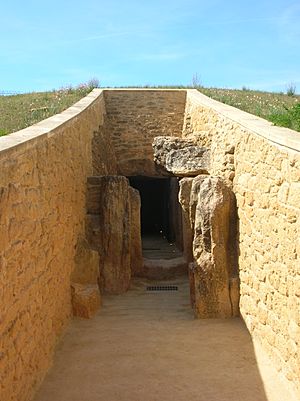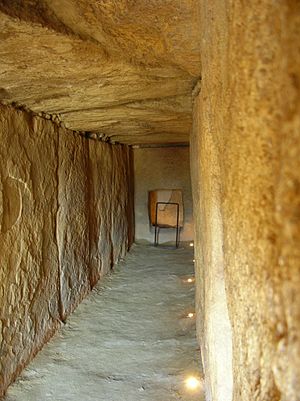Dolmen de Viera facts for kids

Entrance to the Dolmen de Viera
|
|
| Location | Spain |
|---|---|
| Region | Andalusia |
| Type | dolmen and tumulus |
| History | |
| Material | earth and stone |
| Founded | 5,500 years BP |
| Periods | Copper Age |
| Site notes | |
| Archaeologists | Antonio and José Viera |
| Ownership | Council of Culture, Andalusian Autonomous Government |
| Public access | yes |
| Official name | Antequera Dolmens Site |
| Type | Cultural |
| Criteria | i, iii, iv |
| Designated | 2016 (40th session) |
| Reference no. | 1501 |
| Region | Europe and North America |
The Dolmen de Viera is a very old stone structure in Antequera, Spain. It's a type of ancient tomb called a dolmen, which means it's a single room built with huge stones. It's also known as the Dolmen de los Hermanos Viera because two brothers, Antonio and José Viera, found it between 1903 and 1905. This amazing site is close to two other ancient structures: the Dolmen de Menga (only about 70 meters away) and the Tholos de El Romeral (about 4 kilometers away).
Contents
What is the Dolmen de Viera?
The Dolmen de Viera is built using a special method called orthostatic technique. This means it uses very large stones standing upright. It has a long hallway, or corridor, made from twenty-seven stones. This corridor leads to a rectangular room.
The Burial Chamber
This rectangular room is thought to be a burial chamber. Inside, archaeologists found tools made of silica and bone, along with pieces of pottery. The burial chamber is a bit taller and wider than the corridor. It is about 200 centimeters (about 6.5 feet) high and 180 centimeters (about 6 feet) wide.
The Corridor and Stones
The corridor itself is about 185 centimeters (about 6 feet) high. It changes width, starting at 130 centimeters (about 4.2 feet) wide at the entrance and widening to 160 centimeters (about 5.2 feet) where it meets the chamber. The corridor is quite long, stretching over 21 meters (about 69 feet). The huge stones used to build it are thick, ranging from 20 to 50 centimeters (about 8 to 20 inches).
The Mound and Sunlight
The entire dolmen is covered by a large earth mound, called a tumulus. This mound is about 50 meters (about 164 feet) across. Like many ancient tombs in the Iberian Peninsula, the Dolmen de Viera faces slightly southeast. This special direction means that during the summer solstice, the sunlight at dawn shines directly into the burial chamber.
Stone Details
Originally, the corridor likely had sixteen large stone slabs on each side. Today, fourteen remain on the left and fifteen on the right. Five big slabs still form the roof, with parts of two others. It seems three or four more roof slabs are missing. The end of the corridor has a single huge stone with a square hole in its middle. This stone and three others surround the main chamber. The stones on the sides of the corridor are very carefully made. They fit perfectly into special grooves in the entrance stones and the floor.
History of the Dolmen
The Dolmen de Viera was built a very long time ago, during the Copper Age. This was roughly between 3510 and 3020 BCE, which is about 5,500 years ago! It has been recognized as a National monument in Spain since 1923.
Visiting the Dolmen
Today, the Dolmen de Viera is owned by the Council of Culture of the Andalusian Autonomous Government. They manage it as part of the Antequera Dolmens Archaeological Complex. The dolmen has been carefully restored, and you can visit it!
In 2016, the Dolmen de Viera, along with the Dolmen de Menga and the Tholos de El Romeral, became a UNESCO World Heritage Site. This means they are considered very important cultural sites for the whole world.
Gallery
See also
 In Spanish: Dolmen de Viera para niños
In Spanish: Dolmen de Viera para niños





